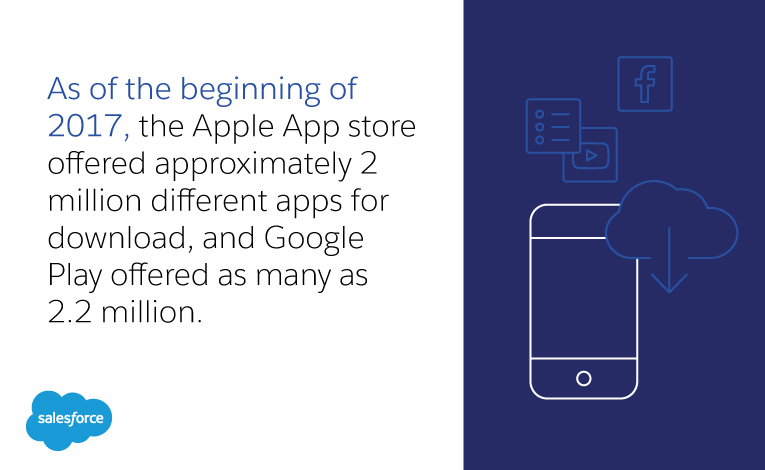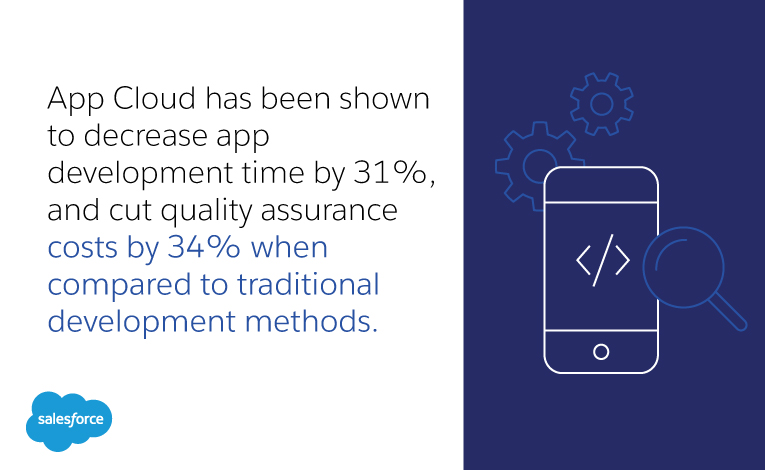Top Trends in Cloud Application Development

As of the beginning of 2017, the Apple App store offered approximately 2 million different apps for download, and Google Play offered as many as 2.2 million. With such a large selection of applications across all conceivable categories, it may be difficult to imagine any problems that can’t be answered by the right app. From entertainment, to personal fitness, to education, and more, it sometimes seems that no matter what you need, there really is an app for that.
Except when there isn’t.

DEMO
See an overview of the Salesforce Platform.

GUIDED TOUR
Get hands on with the Salesforce Platform.

The business world is made up of millions of different entities. In fact, some estimates suggest that there may be as many as 300 million registered businesses across the globe. Despite the overwhelming number of business organizations, no two are exactly alike. As such, when a business needs a unique app solution to a unique problem, a couple million options to choose from may not be nearly enough. This is where cloud application development comes into play.
What Is Cloud Application Development?
Cloud application development is an evolution of traditional app development. Where once app development demanded significant training and prohibitively expensive tools, the rise of cloud services has paved a new way of building and running applications that is much more efficient and scalable.
This is partially due to the fact that while conventional applications generally reside at a single, definite location — such as on a mobile device, desktop computer, or company server — cloud applications suffer no such restrictions.
The underlying services that power cloud apps reside in the cloud, which is to say that they are maintained on remote servers. Builders create apps using a single line of code to call a service from the cloud instead of hardcoding the entire capability in their own servers, and users access the applications over the Internet via standard web browsers. However, unlike web apps, native cloud applications do not require a constant internet connection, and can actually function off-line as well — reconnecting and uploading information when possible.
The advantages of cloud applications for business are undisputable. By housing the applications offsite, organizations save on the costs of hardware installation and upkeep. Cloud apps don’t consume valuable in-house data storage space, and they are not limited to any single location. As long as users have a secure internet connection, they can access the application from anywhere in the world through any device. At the same time, a loss of internet connection will not immediately undermine the app itself, allowing users to continue working on the local device.
Given these and other business benefits, many organizations are simply switching off the servers hosted on their premises and building cloud-based applications. But is it really that simple? No, it generally isn’t — but it could be.
Modern Cloud Platforms Simplify Cloud-Based Application Development.
What do you need to develop a custom cloud application? This isn’t necessarily an easy question to answer.
To start, you need two things: (1) the powerful, trusted platform, and (2) the skills to build on that platform. App development tools such as editors, language resources, and integrated development environments (IDEs), as well as testing, monitoring, and debugging tools are all part of the app development process. Additionally, understanding how these tools work, what your proposed app should be able to do, how to use the programming language to code the app, and what solutions you want the app to solve are all just as important.
Until recently, if all of these were not provided, you would need a fairly comprehensive computer-science background in addition to an in-depth understanding of your business and your customers if you plan on developing a reliable cloud application for your organization.
However, new advancements in cloud app development technology are making it possible for users of all skill levels to conceptualize, build, deploy, and improve cloud-based applications. The end results are complex, integrated, data-heavy solutions, developed on easy-to-use cloud application development platform options. Here are three of the most game-changing tech advancements that are currently revolutionizing cloud app development:
Low-code frameworks.
Although most app developers use Java, Python, or one of the other dozen or so most common programing languages, the truth is that there are literally hundreds of possible programing codes to choose from, each with their own advantages and disadvantages. Understanding not only which language to use, but also how to use the language in question is essential to app development — unless you are using a low-code development framework.
Low-code platforms provide non-technical users with cloud application development tools that handle all of the heavy coding on their own. Templates, point-and-click options, and drag and drop tools give users visually-based building blocks from which to create reliable cloud applications. Likewise, built-in cloud application development tutorial options help ensure that every user has the training they need to accomplish their tasks.
Data integration
A common problem for business app developers is the question of how to load large amounts of secure data into their cloud applications. With so much data to consider, and taking into account issues related to compatibility and security, implementing the right business and customer data into your app can be prohibitively difficult.
Development tools that allow your app builders to integrate with various databases, ERP, Internet of Things, and CRM using point and click capabilities solve this problem. With data integration, your app will have direct access to the resources it needs to provide the solutions you designed it for.
Cloud-based development
Just as cloud applications offer a number of advantages over on-premise apps, development platforms that are entirely web-based are superior to those housed on site. Cloud-based development platforms reduce infrastructure and maintenance costs, while also improving user accessibility and compatibility with other, existing systems and processes.
A major advantage of cloud-based development platforms is that they are regularly updated for security, configurability, and even enhanced with new technologies for machine learning, predictive algorithms and automations tools, allowing them to scale along with your business and your clients.
The Salesforce Platform gives you the power.
With so much focus on the importance of reliable data and cloud-based infrastructure, it’s not surprising that the best cloud application development platform is also the most respected cloud-based CRM platform in the world. The Salesforce Platform gives you the ability to create robust, customized business apps that are powered by the most trusted and secure cloud, for limitless usability and unparalleled collaboration.
By uniting multiple app development services, including Lightning, Heroku, Thunder, Salesforce DX, and more, the Salesforce Platform provides cloud app development solutions for all industries and business needs. By integrating with other Salesforce tools, Platform allows users the opportunity to build their applications with the benefit of reliable data and support.
Interactive tutorials, easy-to-use tools, and low-code options give everyone the power to create engaging, transformative cloud apps quickly. You don’t need to build everything yourself. If you’d rather find a ready-made solution than build one, the Salesforce AppExchange includes a library of over 2,800 apps that you can download and put to work for your business.
What are the Advantages of Business Process Automation?
The main point of business process automation is to free up employees from having to perform certain time-consuming tasks. However, there are other advantages to consider.
By cutting down on the number of processes that require manual input, businesses also reduce process turnaround time. Consider administrative tasks such as auditing or submitting expense receipts. With business process automation, organizations can more quickly review their processes, locating and eliminating potential bottlenecks. As for submitting receipts, employees can enjoy faster reimbursement on business expenses. Complex business processes in all departments can be easily automated, streamlined, and simplified with apps for any team, any role, and any size of business.
The cost advantage of business process automation is another noteworthy benefit. Between improving employee productivity and reducing process turnaround time, BPA has the potential to save businesses large amounts of money. And while there is certainly an initial cost of investment, business process automation tends to pay for itself through increased work efficiency. By ensuring that businesses are getting more out of available time and resources, an effective business process automation solution generates a substantial ROI.
Finally, business process automation built on a reliable platform can effectively eliminate costly mistakes. In fact, it is estimated that data errors and faulty information cost U.S. businesses $3 trillion every year. With effective automation, business-process data is transferred directly between applications, eliminating the risk of human error, and ensuing that valuable information retains its accuracy.

Considering the advantages, many organizations are now in the market for reliable business process automation software. That said, every business is unique, and an out-of-the-box solution is unlikely to effectively address all of an organization's specific needs in a satisfactory way.
For those businesses who want to get the most out of BPA, a solution built on the most trusted, customizable data management platform is certainly worth considering.
The Salesforce Platform has been shown to decrease app development time by 31%, and cut quality assurance costs by 34% when compared to traditional development methods.
Simply put, Platform is the most comprehensive business cloud app development tool ever created, and it’s ready to elevate your apps to new heights of success.
Build the best.
Even with millions of apps available throughout the world, the only way to guarantee that you’ll be able to find the right application for your business is to build it yourself. With the right cloud application development platform, you’ll have the tools you need to ensure that your apps are effective and reliable.
The Salesforce Platform makes it all possible. Now, thanks to Platform, you’ll never have to worry about whether or not there’s an app for that.
Optimize the Processes that Build Business Success
Today’s businesses are far-reaching and astoundingly complex, but that doesn’t mean that their processes need to be a mystery. From single-employee startups to Fortune-500 companies, the right business process automation software can help ensure that every process is running smoothly.
The Salesforce Platform puts advanced technology to work where businesses really need it, and in the process, optimizes the systems that build business success.

